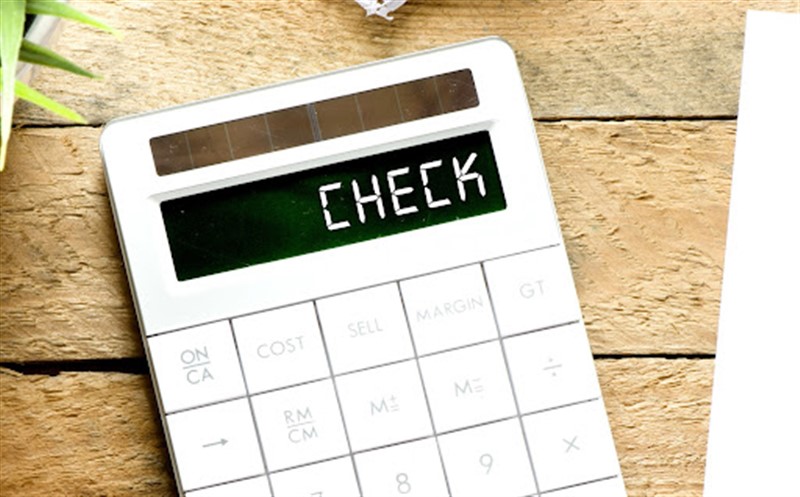The noun check/cheque references a written order to pay someone money from a bank. American English uses “check,” British English prefers “cheque.”
-
 Alanna Madden
Alanna Madden
-
 November 6, 2021
November 6, 2021
-
 Grammar Tips
Grammar Tips
 November 6, 2021
November 6, 2021
 Grammar Tips
Grammar Tips
The noun check/cheque references a written order to pay someone money from a bank. American English uses “check,” British English prefers “cheque.”
The nouns check and cheque both reference a written order to pay someone a certain amount of money, and either paper form comes from a booklet called a checkbook or chequebook.
The main difference between these terms is that check and checkbook are standard for American English (AmE), while cheque and chequebook (sometimes “cheque book”) are more prevalent in British English (BrE).
The only other difference between the nouns is that “cheque” never substitutes the word “check” when it references the act of inspecting, authenticating, or impeding something (as a noun or verb).
CORRECT:
“I need to write a check for $500.” (AmE)
“The account holder wrote the payee a cheque for £10,000.” (BrE)
“Can you check my work for errors?” (AmE or BrE)
“There are circumstances when a spelling check is necessary.” (AmE or BrE)
“Place a tick or checkmark next to your name.” (AmE or BrE)
“Are you checking the chequebook?” (BrE)
“You checked the purse for a checkbook?” (AmE)
INCORRECT:
“You can cheque for your account number on the bottom of your cheque/check.” (AmE or BrE)
“Don’t forget to cheque my purse for my chequebook/checkbook merchandise.” (AmE or BrE)
“I didn’t see a place for a chequemark on the form.” (AmE or BrE)

The spelling of check is older than cheque, as the latter arose in 18th century British English to reference a counterfoil (the initial meaning of “check”). In case you’re unsure of what a counterfoil is, it’s “the part of a cheque, receipt, ticket, or other document that is torn off and kept as a record by the person issuing it.”
Garner’s Modern English Usage (GMEU) explains how cheque gained dominant usage in British English during the 19th century and sometimes makes an appearance in American English. The spelling of check remains the standard spelling for English in the United States (Garner 159).
According to GMEU, the nouns check and cheque “denote a written order directing a bank to pay money to a specified person” (159). In other words, a check/cheque is a form containing directions for their bank to pay a specific person a certain amount of money from their bank account.
Fee, money, money order, payment, settlement.
The switch from English check to cheque arose from the sense that a check was a “device for checking the amount of an item” or “something used to ensure accuracy or authenticity.” However, the connotation ultimately stems from the game of chess, whose namesake derives from the plural form of Old French chek –– the same word that provided English with the noun “check.”
As explained by The American Heritage Dictionary (AHD), the connection between check and chess comes from the notion of “checkmate” (a newer way to state “check”), in which a player must authenticate an opponent’s winning move. In this sense, the utterance traces back to Persia, where Persian shāh (meaning “King!”) was a “warning when the opponent’s king was under attack.”
Ironically, Persian shāh is thought to have passed through Arabic after Persia was conquered by Arabic forces, where it switched to shāh māt, meaning “the king is dead.” The Muslim world introduced chess to Northern Africa, Spain, and Sicily around the 10th century, explaining AHD’s speculations on how these phrases passed through Old Spanish before reaching Old French.
Made evident by the game’s ever-changing terminology, the earliest forms of chess look very different from the version found in Europe and North America today. According to the Encyclopedia Briticanna, the earliest renditions of chess include the war game chaturanga, a game that flourished in India by the 7th century.
Historians believe chaturanga evolved into shatranj (or chatrang), a two-player game enjoyed in northern India, Pakistan, Afghanistan, and southern areas of Central Asia after 600 CE. From there, derivatives of chaturanga or shatranj made their way to Europe by way of Persia and even developed similar versions in the East via Buddhist pilgrims and various trading routes.
“On the 100 block of Brush Hill, a resident reported writing a check for $70 which was cashed at an unknown location for $700.” — Chicago Tribune
“It’s not just embarrassing to bounce checks — you will also face an NSF (insufficient funds) charge that your bank will withdraw from your account.” — MoneyWise
“Minneapolis estate law attorney Susan Link told the AP that the estate will be “writing a check for a whole lot of money” come tax season.” — People Magazine
“In January 2019, the householder paid him £5,800 for roof repairs, before handing over a cheque for £10,000 a few months later…” — BBC
“Prince Michael of Kent, the Mahfouz Foundation’s patron, awarded a cheque to the chancellor of the college on behalf of the Mahfouz Foundation.” — The Guardian
“The news that Chris Jordan will be returning to the Oval next season came in for criticism on social media, with many accusing Surrey of waving a cheque book rather than producing homegrown players.” — South London Press
If you enjoy learning differences between American English and British English, be sure to check out similar lessons by The Word Counter, such as:
Test how well you understand the difference between check and cheque with the following multiple-choice questions.
Bonus questions:
Quiz Answers
Bonus Questions
Photo contributors: Main image by CreditScoreGeek; Second image by Alistair MacRobert (@alistairmacrobert) on Unsplash.